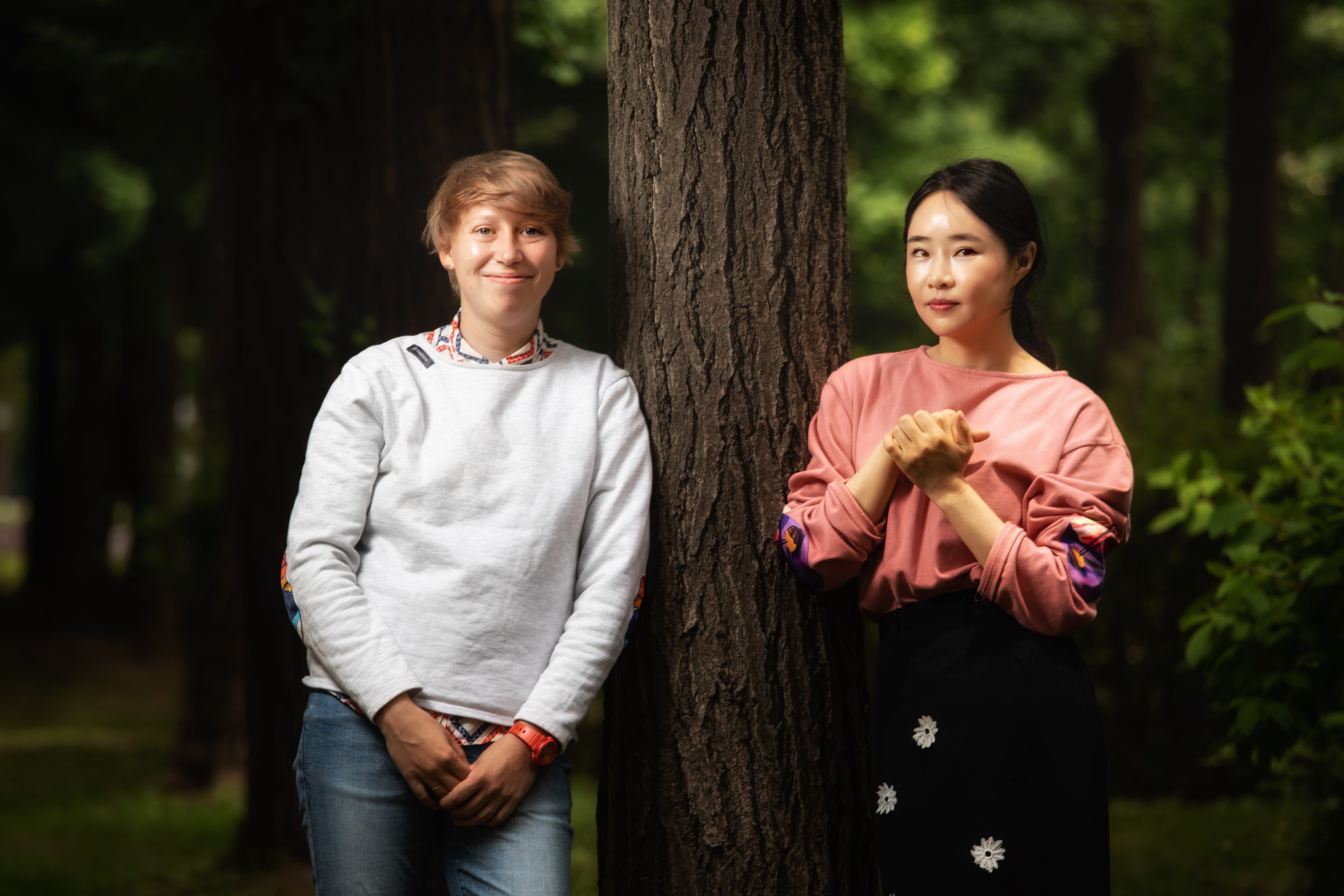INTERVIEW: Fashion turns adversity into hope for NK defector
Date Jun 09, 2021
 Marie Boes, left, and Kang Ji-hyun, founders of social impact fashion brand ISTORY. Photo by Choi Won-suk
Marie Boes, left, and Kang Ji-hyun, founders of social impact fashion brand ISTORY. Photo by Choi Won-suk
●QR codes on clothes help this designer tell the stories of fellow defectors.
●Her aim is to help southerners learn more about the lives of their northern neighbors.
North Korean-born fashion designer Kang Ji-hyun always felt many stories of the harrowing escapes of her fellow defectors remained untold.
She went on a hunt to capture the real, human stories of defectors – many of whom still face deep-rooted prejudice in South Korean society – and found her answer in fashion, specifically in elbow patches on shirts.
“For me, the medium of these stories had to be clothes, since fashion design is something I am good at. And I wanted the tales to be readily accessible to anyone simply by wearing the clothes,” she said.
In April, she launched her brand, ISTORY, with her Belgian friend Marie Boes, whom she met at an entrepreneurship boot camp called Asan Sanghoe last year. A total of 10 defectors’ stories have been encapsulated in the brand’s growing inventory.
The life of Ha Jin-u is one of them.
At the age of six, Ha saw his father being taken away by North Korean security agents after being falsely accused of receiving money from South Korea. Although he was released a year later, he had suffered horrible torture and was left destitute, forcing Ha’s family to search for work to put food on the table. Eventually, they started farming Dybowski’s frogs and exported them to China, where the frogs were in high demand as a stamina booster.
As business with China grew, neighbors began asking him to help their relatives in South Korea send money back to them. A few years later, one asked him if he could bring people across the border with China. That’s how Ha became a broker at the age of 15, helping more than 100 fellow North Koreans flee the country for five years. But his operation was inevitably discovered in 2013, forcing Ha to also flee the North.
But when Kang sketches a pattern based on her interviews with refugees like Ha, she doesn’t focus on the “sensational” aspect of their lives. Instead, she captures the passions, hopes and dreams of their new lives in South Korea.
Consequently, Ha’s story was reborn in the form of an elbow patch depicting a truck speeding through wilderness in a scenic, orange sunset. Having worked as a truck driver for two years after crossing the border, Ha hopes to help people in the South freely visit their Northern hometowns and neighbors when the two Koreas are reunited. In other words, he wants to get back to his old job, but sending people into North Korea instead.
 Elbow-patch shirts designed at ISTORY. Courtesy of ISTORY
Elbow-patch shirts designed at ISTORY. Courtesy of ISTORY
In addition to Ha’s experience, ISTORY’s shirts recount the lives of an essayist, a cook and an aspiring film director, among others. Each comes with a QR code printed on the back of the neck, which can be scanned to access – in English and Korean – the detailed meanings behind the individual designs.
Kang hopes to tell the stories of all 35,000 defectors residing in Korea through her clothes and bring an end to prejudice and discrimination against them.
“People outside of Korea view North Korea as a poverty-stricken country, but they don’t know much else about the people. They have their own prejudices toward us, different from those held by South Koreans,” she said. “I wanted to tell them the human side of our stories and show them that we are no different.”
Co-founder Boes echoed the sentiment, speaking from her personal experience. Before she met Kang, she never had a chance to get close to anyone from North Korea.
“I had my own idea of who they are, mainly from visiting the DMZ and watching documentaries. Meeting Ji-hyun changed my whole concept about them. I’ve learned a lot from that experience, and that’s something I want to share with others,” she explained.
“After ISTORY launched, my dad read all of the defectors’ stories and told me, ‘I didn’t realize so many of them have a career and a happy life.' We still hold many prejudices, stereotypes of those who have settled here and they are simply wrong.”

The Ministry of Culture, Sports and Tourism's "Korea Here & Now" work can be used under the condition of "Public Nuri Type 1 (Source Indication)."




